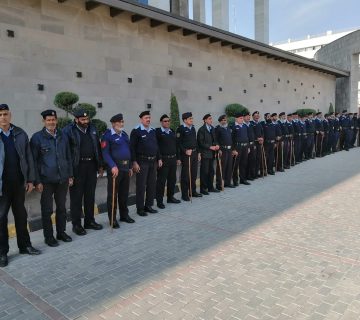ISLAMABAD, Aug 30: Supreme Court Justice Mansoor Ali Shah remarked on Wednesday that the court must take into account who the petitioner challenging the recent amendments in the National Accountability Ordinance (NAO) was.
Sitting on a three-member special bench, led by Chief Justice of Pakistan (CJP) Umar Ata Bandial, Justice Shah said that “if the NAO amendments were such a big problem, a citizen would have challenged them, no financial institution challenged the amendments, nor any political party, a fugitive politician from the parliament approached the SC”.
“To date it remains unclear what aspects of the law are contrary to fundamental rights provisions,” he observed expressing “surprise” that the court has been hearing the case for so long.
Today marked the 50th hearing of a petition filed by Pakistan Tehreek-e-Insaf (PTI) chief Imran Khan challenging the National Accountability (Second Amendment) Act 2022 passed by the Pakistan Muslim League-Nawaz (PML-N) led coalition government.
In the previous hearing, Justice Shah had stressed for a second time, requesting to the CJP, to constitute a full bench to hear the matter. He has maintained that the NAO amendments case should either be heard in the presence of an injunction on a law – namely, the SC (the Practice and Procedure) law – or a full court should be constituted.
Meanwhile, CJP Bandial had remarked yesterday that “the Attorney General for Pakistan (AGP) had spoken of inconsistencies between the SC (the Practice and Procedure) law and the SC (Review of Judgment) Law, on June 1, 2023. The AGP had asked for some time on June 8, 2023,” the chief justice observed.
He added that the AGP had also said that the parliament would correct the law after the budget session. “I am unaware what the current (interim) government’s stance on the matter is,” he said, asking whether the court should delay all cases in light of a suspended law, or continue its work.
As the court resumed the hearing today, the AGP took to the rostrum to clarify that he had not stated that the law was “flawed” but merely conceded that there was an “overlap” between the Practice and Procedure Law and the Review of Judgment Law.
CJP Bandial also observed that “several good amendments have been introduced” as well but regretted that not only were there “inconsistencies” between laws, but that the CJP’s powers had been reduced to “a rubber stamp”.
“The parliament was very active in August,” he added, observing that revisions on the two said laws did not appear to be “a priority” for the parliament.
The AGP explained that the parliament had been waiting for a decision from the apex court on the matter and had therefore, not acted to revise the laws. This explanation however was not well-received by the top judge.
The court has sought an updated list of NAB cases transferred after the amendments were introduced.
“Many offences were either deleted or changed in the NAB amendments,” observed CJP Bandial, “a crucial point in the present case is that the entire law has been turned upside down.” He also noted that “the petitioner has given some Islamic examples for accountability standards” and that “accountability is the basis of the democratic process”, regretting that as a result of the tweaks to the law “many of the offences were either expunged or the evidentiary procedure was altered”.
He stressed that the court must be satisfied that “no crime has been abolished”. He also expressed reservations over how difficult the process of proving a corruption case has been made through the changes.
“It must be ensured that the crime of corruption has not been reduced to mere paperwork,” said CJP Bandial.
At one point Justice Shah proposed that the issue of NAB law tweaks could be left up to the next parliament. “Why don’t we leave the issue of NAB amendments to the new parliament?” he said while seeking arguments about the application of NAB amendments from the past.
The case was adjourned till tomorrow.




No comment